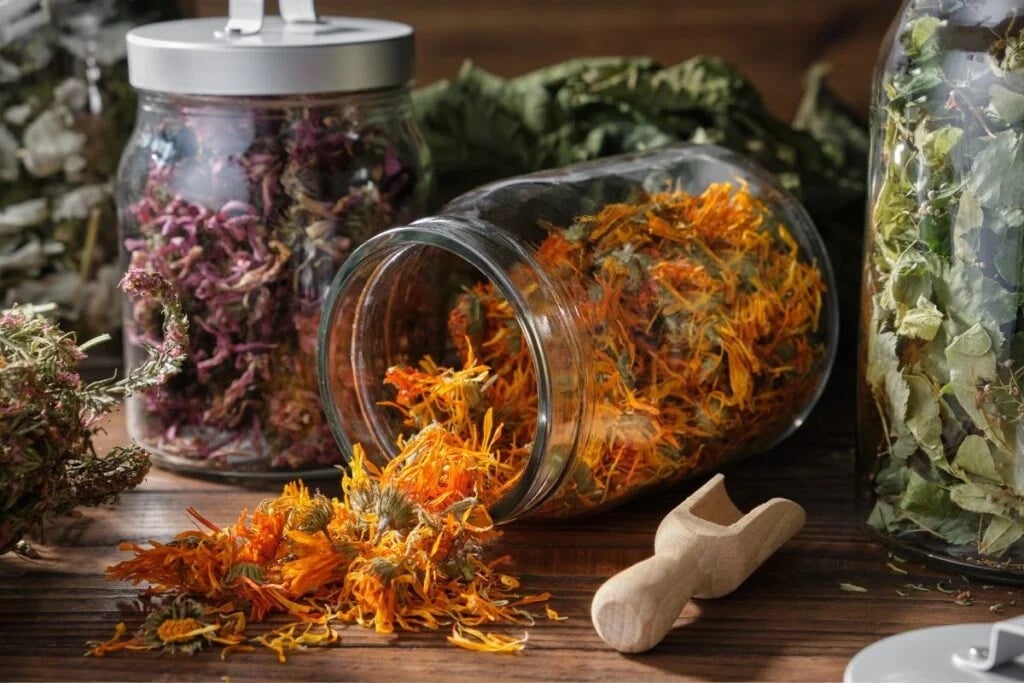The dog rose (Rosa canina) is a dense deciduous shrub that grows up to 1.5–2.5 meters in diameter. The branches are thick but rarely straight. The bark is greenish-brown and changes color to brick red or matt red when exposed to sunlight for a long time. The fruits (rosehips) are round, broadly oval or ovoid, 1,5-2,5 cm in diameter, and covered with a smooth, glossy red-orange skin. They ripen, usually in the second half of August. The most common uses of fruits include rose hip tea. The beverage has a bunch of rose hip tea benefits.
Dog roses grow practically all over Europe, Western and Central Asia, and North Africa. In warm climates such as the Caucasus and the Black Sea coast, shrubs are vigorous and form almost impenetrable thickets.
You can buy rose hips in shops and pharmacies, or you can pick fresh fruit in the wild if you find these bushes away from roads, factories, and other sources of pollution. Dog roses grow in dense forests, on hillsides covered with grass or other shrubs, on the banks of water bodies, or along roadsides. It is an easily growing plant, which is a favorite garden shrubs.

Harvesting Materials from Dog Roses
You should start to pick the fruit from the bushes when the skin has completely turned red-orange. This is usually in the last ten days of August or early September. Harvest the rose hips with the seeds. Discard any damaged fruit in the harvest. Treat the rosehips immediately after harvest The longest you can wait is 2–3 days. Cut rose hips in half and clean them from the seeds.
Pick the doge rose branches before the first frost, as even a short exposure to freezing temperatures will result in nutrient loss. Be sure to wear protective gloves to protect your hands from the sharp thorn needles.
You can dry dog rose twigs and hips in some ways, but do not wash them. Dry the material in the attic or outdoors in a well-ventilated area with protection from direct light, in an oven, or an electric dryer. Put the twigs or fruits arranged in a single layer and dry, until they harden and you can easily break them with your fingers. However, the skins of the fruits must not be dark and must retain their original color.
When you dry the material, store the harvest in a dark, cool place with relatively low humidity. Keeping them in paper or cloth bags, airtight plastic, or glass containers for up to 2 years is preferable.
Dog Roses: Rich in Chemical Compounds
In folk medicine, rosehip is most valued for its high vitamin C content. This vitamin restores the immune system and maintains the body’s tone. In addition, rosehips contain a bunch of vitamins, such as:
- A, which is beneficial for immunity and eyesight;
- K is essential for normal blood clotting;
- P: strengthens capillary walls and helps maintain the permeability of blood vessels;
- B participates in enzyme synthesis, some hormones, and red and white blood cells.
Rosehips also contain flavonoids, tannins, pectins, fruit acids (apple and lemon), essential oils, organic sugars (glucose, sucrose, and fructose), camphor, quercetin, lycopene, rubixanthin, and macro- and micronutrients (potassium, phosphorus, magnesium, sodium, zinc, iron, selenium, copper, manganese, chromium, cobalt, and molybdenum).

Rose Hip Tea Benefits
In folk medicine, the raw material of rosehip is valued as a medicinal herb—an immunostimulant and antioxidant with antiviral, anti-inflammatory, diuretic, antispasmodic, and wound-healing properties.
The beneficial substances are mainly concentrated in the rosehip peel. This is the most widely used medicinal raw material. Less commonly used are the leaves, seeds, or roots of dog roses. Traditional medicine practitioners recommend rose hip tea (and preparations for more severe conditions) to address these health problems:
- avitaminosis;
- restoring immunity after a long illness or surgery;
- frequent colds, acute viral respiratory infections;
- anaemia;
- metabolic disorders, hormone imbalances;
- atherosclerosis, especially if the blood vessels need to be cleansed of not only cholesterol but also fatty deposits;
- hypertension, coronary heart disease;
- pneumonia, whooping cough, and other diseases of the bronchial and pulmonary systems accompanied by inflammation;
- urinary, gallbladder, and kidney stones;
- eczema, psoriasis, or any dermatological diseases;
- wounds, ulcers, or burns of the skin and mucous membranes that do not heal;
- stomach or intestinal ulcers;
- reduced gastric secretion;
- liver diseases;
- rheumatism, gout;
- myopia and hyperopia in the early stages of development;
- for women with heavy menstruation or frequent uterine bleeding.

What You Can Make from Dog Roses?
Dog roses are used in diverse ways in both folk and traditional medicine. However, the most popular remedies are made from its fruit. These are rose hip tea, syrup, tinctures, and others.
Rose Hip Tea
To make a rosehip tea, you will need 80–100 g of dried rose hips and 1 liter of water.
The preparation follows these steps:
- Wash the fruit well.
- Bring the water to a boil in a saucepan and add the rose hips.
- Boil over low heat for about 5–7 minutes.
- Cover the pot with a lid, cover with a towel, and leave for 5–6 hours. Before use, strain the decoction and squeeze out the fruits.
- The decoction does not taste unpleasant, but you can add lemon juice or honey.
Store the decoction in the fridge for up to two days.
Drink 1/4 cup of rose hip tea three times a day, about half an hour before meals, for treating pancreatitis, gastritis, and exacerbations. In remission, reduce the dose to 2 tablespoons. Do not add honey or lemon juice to the decoction, as these additives can harm the pancreas.
You should drink rose hip tea regularly if hypertension occurs and you would like to normalize blood pressure. Take half a glass of decoction or 1 teaspoon of syrup (see below) three times a day, immediately after meals, if the disease exacerbates.
Rose hip tea normalizes metabolism, activates digestion, and removes toxins from the body. Dieters advise to drink about half a glass of the infusion 15-20 minutes before meals.

Enriched Rose Hip Tea Benefits
To the rosehip tea just described, depending on your taste or existing ailment, you can add the following ingredients:
- dried chokeberries, blackcurrants, or raspberries;
- fresh or dried mint or lemon balm;
- cardamom, cinnamon, or anise;
- black or green tea;
- fresh, sour green apples.
The proportions are random, according to your taste. Take the previously prepared rosehip decoction, add the other ingredients (if necessary, crush them beforehand), and leave to stand for 5–6 hours under a closed lid.
A decoction made from rosehips and dried raspberries helps with colds. Prepare it as usual and drink it warm, about 1 liter daily. For sore throats, take 1/2 teaspoon of rosehip syrup after meals. Tea prevents colds.

Rosehip Syrup
This syrup with health-giving properties can be used to flavor a variety of teas, pancakes, ice cream, or other dishes. To make rosehip syrup, you will need:
- 1,5 l of fresh, unpeeled rose hips,
- 1,5 kg of sugar.
- 2 liters of water.
Bring the water to a boil and add the berries. Cover with a lid, and boil over low heat for about 40 minutes. Remove the pot from the stove, cover warmly with a towel, and leave to stand for 10–12 hours. Strain the decoction into another container, squeeze the berries, and add the sugar. Cook the syrup over medium heat until it thickens (about 30–40 minutes after boiling).
Pour immediately into sterilized glasses or bottles and seal. Allow it to cool. Store the prepared syrup in the fridge or a dark and cool place.

Alcoholic Tincture of Rosehips
Place 400–500 g of fresh, whole, or peeled rose hips in a glass bottle or jar and pour over a liter of vodka or ethyl alcohol diluted to the appropriate strength. Leave the jar in a dark place for 15-20 days, shaking the contents vigorously daily. You don’t need to refrigerate the tincture, but keep it out of direct sunlight.
Side Effects of Rose Hip Tea
Like any remedy or herb used in folk medicine, rose hips can cause side effects in some people:
- chronic gastritis with increased stomach acidity;
- susceptibility to thrombophlebitis;
- many cardiovascular diseases, such as endocarditis;
- hypotension;
- frequent constipation.
Allergies to rosehip-based products are not uncommon. Side effects are usually avoided in small quantities, but if you intend to use rose hip tea, syrup, or tincture in larger quantities for therapeutic purposes, consult your healthcare practitioner before use and monitor your well-being during use.
Sources:
https://www.healthline.com/nutrition/rosehip-tea
https://www.webmd.com/vitamins-and-supplements/rosehip-uses-and-risks
Associative photos © Canva.

